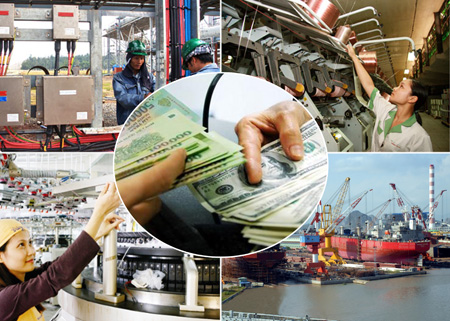WB: Vietnam to grow 5.7 per cent in 2012

The report released on May 23 said that after a long period of heightened turbulence, Vietnam’s economy is gradually entering a more stable macro-economic environment. The macro-economy has become more sustainable especially after the Vietnamese government introduced measures in February 2011 to stabilise the economy and ensure social stability (the so-called Resolution 11).
According to the report, while the Vietnam’s economy has started to stabilised, the significant tightening of macroeconomic policies, along with uncertain global economic environment are beginning to take a toll on its economic growth.
Real GDP growth accelerated from 6.8 per cent in 2010 to 5.9 per cent in 2011 and further to 4 per cent in the first quarter 2012 as domestic demand slowed, affecting construction, services and utilities.
Tighter domestic policies in 2011 have dampened investment and private consumption. Thanks to a combination of these measures and falling food prices, inflation declined to 10.5 per cent year-on-year in April 2012 from a peak of 23 per cent in August 2011.
The current account deficit is estimated to have declined to 0.5 per cent of GDP in 2011, from 4.1 per cent in 2010 mainly due to a broad-based rebound in exports.
Export earnings soared by 34.2 per cent in 2011 and continue to growth. Exports in Q1 were 23.6 per cent higher compared to the same period last year.
Pressures on the exchange rate have continued to decline in Q1, 2012 as confidence in the dong has gradually picked up. The unofficial exchange rate has remained close to the lower edge of the +/- 1% around the official rate.
Government measures have led to a sharp decline in credit growth, from 32.4 per cent at the end of 2010 to 14.3 per cent by the end of last year. However, asset quality has deteriorated in part due to rapid credit growth before 2011 and the slowdown in the real sector.
Vietnam’s public debt is likely to remain sustainable if the economic recovery continues and the authorities remain on the current path of fiscal consolidation. The World Bank’s Low-Income Country Debt Sustainability Analysis shows that Vietnam remains at a low risk of debt distress.
On March 1, the prime minister issued Decision 254 on “Restructuring credit institution system in the 2011-2015 period.” The document provides a framework to deal with the weak banks and sets out a number of targets to be achieved by 2015.
Vietnam’s near-term policy challenge is to maintain macro-economic stability and restore confidence among investors, while also addressing longer-term structural reforms.
The Vietnamese government is stepping up efforts to restructure SOEs, public investment management, and the financial sector.
A number of key regulations including the ones involving medium-term investment planning, management and supervision of state capital investment in SOEs, and performance monitoring of SOEs are likely to be enacted during 2012. Vietnam should return to a more sustainable macroeconomic environment while laying the foundations for greater efficiency and productivity to drive medium-and longer-term growth.
What the stars mean:
★ Poor ★ ★ Promising ★★★ Good ★★★★ Very good ★★★★★ Exceptional
 Tag:
Tag:
Related Contents
Latest News
More News
- Foreign fruits flood Vietnamese market (December 09, 2025 | 13:22)
- Vietnam’s fruit and vegetable exports reach $7.8 billion in first 11 months (December 05, 2025 | 13:50)
- Vietnam shapes next-generation carbon market (November 26, 2025 | 15:33)
- PM urges Ho Chi Minh City to innovate and remain Vietnam’s economic locomotive (November 26, 2025 | 15:29)
- Experts chart Vietnam's digital finance path: high hopes, high stakes (November 14, 2025 | 10:56)
- Vietnam’s seafood imports surge 30 per cent in first 10 months (November 10, 2025 | 19:35)
- Vietnam’s durian exports hit $1 billion milestone (October 30, 2025 | 17:41)
- Beyond borders: Sunhouse and new era of Vietnamese brands on Amazon (October 28, 2025 | 10:46)
- Record-breaking trade fair set to open in Hanoi (October 15, 2025 | 15:59)
- Timber sector seeks solutions to VAT refunds (October 14, 2025 | 18:58)






















 Mobile Version
Mobile Version